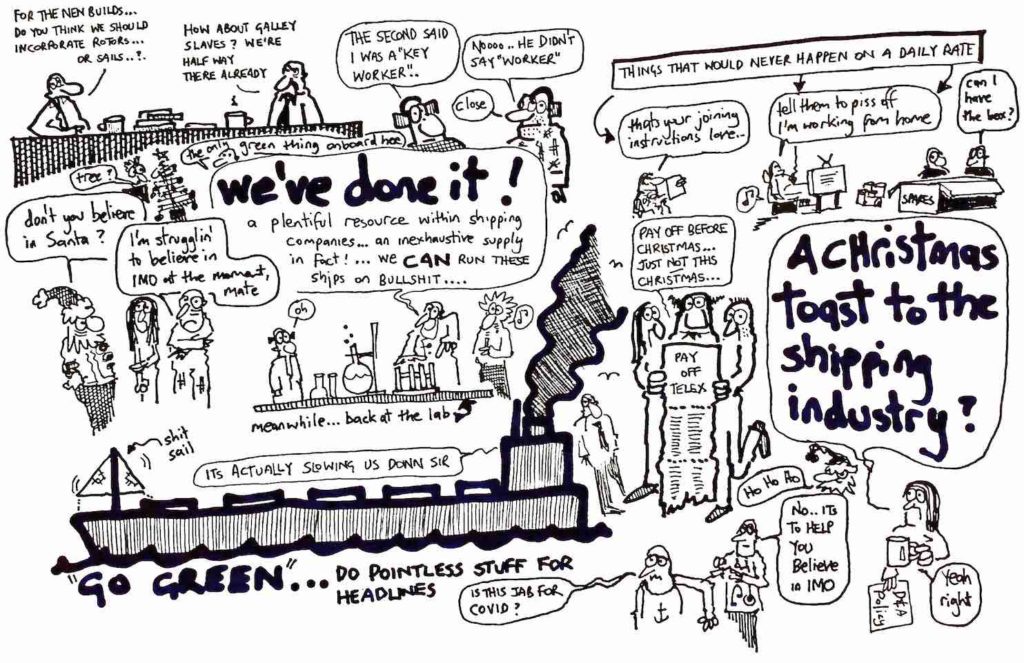Splash Annual Review: Running fast towards new horizons

In hindsight, peak pandemic ennui hit our household here in southern France on Sunday, April 26.
Shorn of regular pastimes such as hurling abuse at my struggling football team, Charlton Athletic, we settled down to watch a Danish employee of Maersk, Asbjorn Kops (pictured), run 210 laps around and around his garden in Liverpool raising money for Seafarers UK on the day he should have been competing in the London Marathon. At the time, France was deep into its first lockdown where to go outside required filling out a form and you were limited to an hour outdoors within a 1 km radius. Said form-filling came to an end for the second time earlier this week, while Asbjorn, bless him, ran another marathon back along the streets of his native Copenhagen on the day of the rescheduled professionals-only London Marathon in October.
Still, France’s few weeks of confinement are nothing to the extraordinary hardships the world’s seafarers have endured this year, with hundreds of thousands unable to step ashore, let alone head home for months on end.
Their plight has to be recognised and rectified pronto, putting crew at the front of the queue for vaccines and on the first available planes home – and more long term, reviewing and upgrading benefits packages for this invisible workforce who have been through hell this year.
Ship tech zooms ahead
As an editor the coronavirus has been a unique story, something journalists have not encountered for more than 70 years in terms of its full on, 360-degree, all encompassing whack-a-moleness. At its outset, we were tagging individual stories ‘Coronavirus’ into the admin side of our website, that quickly became irrelevant; literally every story we have written for the past nine months or so has in some way or another had some pandemic influence.
Shipping zoomed ahead this year in terms of technology – by common consent we’ve fast forwarded two or three years in terms of tech take-up because of the pandemic, thanks in no small part because we can’t travel to meet people, something this most global and person-to-person industry has always taken for granted until this year.
The green agenda
A quick check of my email inbox shows it has been fully 385 days since I last boarded a plane – and by extension since I last saw my parents. The fact is, sure, I want to see friends and family, but this year I have not missed flying per se.
Of the thousands and thousands of corona-related stats that have assaulted me this year one does stand out that I first came across from Norwegian class society DNV GL in the summer. To reach the 1.5 degree Paris climate agreement target, the planet would need to repeat the decline in emissions it is experiencing in 2020 every year from now on. Think of how little you have done in general in 2020 compared to last year, bar baking some fine bread, no doubt, and then think about this stat further as you dream of returning to a normal country-hopping life post-vaccination.
The global response to the Covid-19 pandemic has driven the biggest annual fall in CO2 emissions since World War Two. According to the team at Global Carbon Project, this year saw carbon emissions decline by 2.4bn tonnes.
While you might think that Splash is overly harsh in its coverage of shipping’s emissions progress, let me share with you some fine yuletide spirit. Shipping is officially more than just on the cusp of change, it’s well down the track, more so than aviation I was reading in one report this week from consultancy SYSTEMIQ.
Regular readers will know I am a stat-aholic. Like the DNV GL stat mentioned above there was another one that jumped out at me recently.
As of the end of November, according to Clarksons Research, a remarkable 27% of all tonnage under construction will use alternate fuels. Now I admit that LNG is a major proportion of this – and is not the solution to the planet’s woes – but, seriously, this is a stat that has to be commended.
The year 2020 has been marked by some hugely exciting ship design breakthroughs, our industry is moving fast, faster than many think, to green new pastures.
I mentioned earlier how shipping is now perceived as being ahead of aviation when it comes to its environmental credentials. Just how far? Five years or so, if one takes the recently published transport directives from the European Commission. The folk in Brussels suggest shipping ought to be in a position to have zero-emission vessels on the water by 2030, whereas it’ll take their aviation counterparts until 2035 to get their act together. That’s a pretty impressive change in how these two industries are perceived.
Now, enough of my wittering, before I pass on to The Freaky Wave’s festive take below, I would like to wish all our readers a happy new year – today marks the final day subscribers will be getting a daily newsletter from us through to January 4. Rest up, stay well, and stay tuned. Here comes The Freaky Wave (click on the image to enlarge the humour).


Very well put Sam – the World’s seafarers really deserve more recognition. Thanks also for reminding me of my two 2020 marathons. Although memorable in their own strange way I do look forward to finally running the actual London Marathon April 2022.
Take care, Merry Christmas and Happy New Year.